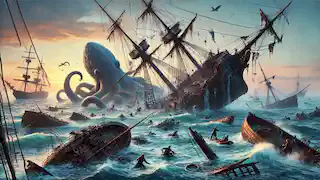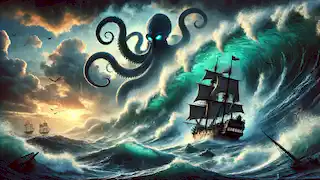The seas around Norway, Greenland, and Iceland have long been the source of legends and mysteries. Among the many tales told by the sailors who braved these cold, treacherous waters, one stands out as both terrifying and awe-inspiring: the legend of the Kraken. This colossal sea monster, said to dwell deep beneath the waves, has been the subject of fear and fascination for centuries. Some believe it to be a creature of myth, while others swear by their encounters with the beast, claiming that the Kraken is as real as the icy winds that whip across the North Atlantic.
The Kraken, often described as a gigantic octopus or squid, was said to be so large that it could wrap its tentacles around entire ships and drag them into the abyss. The mere sight of the creature was enough to send even the bravest sailors into a panic. The legend of the Kraken is a story not just of the monstrous sea creature itself, but of the people who encountered it, the sailors who survived its attacks, and the cultures that were shaped by the fear and respect it commanded. The legend of the Kraken finds its roots in the rich tapestry of Norse mythology and seafaring folklore. The Norse people, who inhabited the rugged coastlines of Scandinavia, were no strangers to the dangers of the sea. Their lives were intertwined with the ocean, and their mythology often reflected the awe-inspiring and terrifying power of the natural world. The Kraken was one such embodiment of this power—a creature that represented the untamable and unpredictable nature of the sea. According to the oldest stories, the Kraken was not merely a beast but a force of nature, perhaps even a god or a demon. Some tales suggest that it was a creation of the gods, sent to test the bravery and skill of the seafarers who ventured into its domain. Others claimed that it was a punishment for those who disrespected the ocean, a reminder that no man could conquer the sea without paying a price. The Kraken's size was said to be so enormous that when it surfaced, it could be mistaken for an island. Sailors would sometimes land on what they thought was a small atoll, only to realize too late that they had anchored on the back of the beast itself. As seafaring became more common, so too did stories of encounters with the Kraken. These accounts, often passed down through generations of sailors, varied in their details but shared common elements of terror and survival. One of the most famous tales comes from the 13th century, when an Icelandic sailor named Leifur the Fearless allegedly encountered the Kraken while navigating the treacherous waters between Iceland and Greenland. According to the legend, Leifur and his crew were sailing through a particularly foggy stretch of sea when they noticed an unusual disturbance in the water. The waves began to churn violently, and a foul stench filled the air. Before they could react, a massive tentacle rose from the depths, followed by another, and then another. The crew fought desperately to escape the creature’s grasp, cutting at the tentacles with axes and spears. After what felt like hours, they managed to break free, but not before losing half of their men to the beast. Leifur’s tale spread quickly, becoming one of the earliest recorded accounts of the Kraken. His story was later corroborated by other sailors, who reported similar encounters in the same region. These stories fueled the belief that the Kraken was not just a myth, but a real and present danger in the North Atlantic. Over time, the legend of the Kraken evolved, influenced by the cultural and scientific developments of the time. As explorers ventured further into the unknown, the Kraken became a symbol of the perils of the sea, a representation of the fear of the unknown. In the Age of Exploration, when European sailors began to map the world’s oceans, the Kraken was often depicted on maps as a warning to those who might venture too far from the safety of the known world. In the 18th century, naturalists and scientists began to take an interest in the stories of the Kraken. Some believed that the creature might be based on real animals, such as the giant squid, which had only recently been discovered. The giant squid, with its enormous size and long, powerful tentacles, seemed to match the descriptions of the Kraken in many ways. This led to a resurgence in interest in the legend, as people began to wonder whether the Kraken might indeed be a real creature, lurking in the depths of the ocean. The Kraken also found its way into literature and art, where it was often portrayed as a monstrous and malevolent force. In the 19th century, the famous poet Alfred Lord Tennyson wrote a sonnet titled "The Kraken," which described the creature as a vast, slumbering entity, waiting beneath the waves for the end of days. This depiction of the Kraken as a primordial, almost Lovecraftian horror influenced many later works of fiction, cementing the creature’s place in the popular imagination. Despite the enduring power of the Kraken legend, modern science has largely debunked the idea of such a creature existing. While the giant squid and its even larger cousin, the colossal squid, are real animals, they are not nearly as large or as aggressive as the Kraken of legend. Most scientists believe that the stories of the Kraken were likely inspired by sightings of these animals, combined with the exaggerations and embellishments that naturally occur in oral storytelling traditions. However, the legend of the Kraken has not been completely dismissed by the scientific community. In recent years, there have been several expeditions to the deep ocean aimed at uncovering the mysteries of the deep-sea environment. These expeditions have revealed that there are still many unknown creatures living in the depths, some of which are as strange and terrifying as any mythological beast. While it is unlikely that the Kraken itself will ever be found, the possibility that the deep ocean holds creatures that have yet to be discovered continues to fuel the imagination. Today, the Kraken remains a powerful symbol in popular culture, often appearing in films, books, and video games as a fearsome and unstoppable force. From the “Pirates of the Caribbean” series to the “Clash of the Titans” films, the Kraken has become a staple of monster mythology, representing the enduring fear of the unknown and the uncontrollable power of nature. In some ways, the Kraken has transcended its origins as a specific sea monster and has come to symbolize the broader concept of the ocean’s mysteries. The deep sea, with its vast, uncharted territories and strange, alien-like creatures, is one of the last frontiers on Earth, and the Kraken serves as a reminder of the awe-inspiring and sometimes terrifying wonders that might still be lurking in its depths. Even as our understanding of the natural world continues to grow, the legend of the Kraken persists, a testament to the power of myth and the enduring allure of the unknown. The Kraken may not be real in the way that we once imagined, but it remains a powerful force in our collective imagination, reminding us of the dangers that lie beyond the horizon and the mysteries that may never be fully understood. The legend of the Kraken is a story that has evolved over centuries, shaped by the fears, hopes, and imaginations of the people who have encountered it. From its origins in Norse mythology to its place in modern pop culture, the Kraken has remained a symbol of the unknown, a creature that embodies the terror and majesty of the sea. Though we may never know the full truth behind the stories of the Kraken, the legend continues to captivate us, inviting us to explore the boundaries of our world and our understanding of it. In a world where so much has been discovered and mapped, the Kraken reminds us that there are still mysteries to be solved, still places where our knowledge is incomplete, and still creatures that defy our expectations. The Kraken’s legacy lives on, not just in the tales told by sailors, but in the way it challenges us to confront our fears and our fascination with the unknown. It is a legend that speaks to the deepest parts of our psyche, tapping into the primal fear of what lies beneath the surface and the eternal human desire to explore the farthest reaches of the earth—and perhaps, one day, the stars.The Origin of the Kraken
Encounters with the Kraken
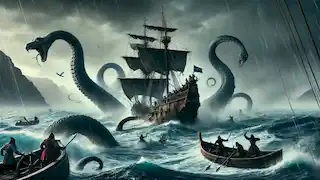
The Kraken in Popular Culture
The Scientific Perspective
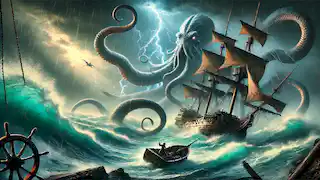
The Kraken in Modern Times
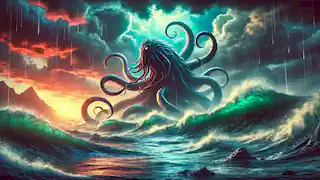
Conclusion: The Lasting Legacy of the Kraken
